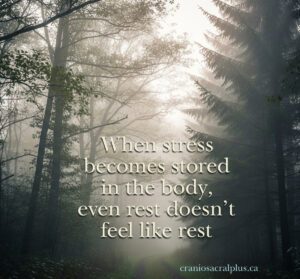
Chronic Stress and Fascia: Why Your Body Feels So Tight All the Time
You stretch. You try to relax. You get massages. But no matter what you do, the tension keeps coming back.
If this sounds familiar, you’re not alone. Many people live with deep, lingering tightness in their bodies that doesn’t seem to go away, even with rest, movement, or time. What you’re feeling may be less about muscle tension – and more about fascia that’s been guarding for years.
What Is Fascia, and How Does It Respond to Stress?
Fascia is the body’s connective tissue, a vast, web-like network that surrounds and supports your muscles, nerves, bones, and organs. It’s flexible, responsive, and incredibly intelligent.
Under healthy conditions, fascia is fluid and elastic, allowing your body to move freely and communicate internally with ease.
But under chronic stress, fascia starts to contract and hold. This isn’t a conscious choice, it’s how your body responds when it feels threatened.
And the longer that stress continues, the more deeply the fascia tightens. What starts as subtle tension can build into a long-term pattern of restriction – physically and emotionally.
The Body’s Protective Patterns
Your body is wired to protect you. When your nervous system senses threat – whether it’s physical pain, emotional overwhelm, or even daily stress – it responds by bracing. Muscles tighten. Breath shortens. Joints compress. You may clench your jaw, lift your shoulders, hold your stomach tight – all without realizing it.
These responses are not flaws. They’re part of your built-in survival system.
But over time, the body begins to live in this pattern. The tension becomes familiar. And even when life has calmed down, your system may still be on guard.
People often say, “I don’t know why I feel this tight — nothing has happened.” It’s not about something recent or obvious. It’s about what your body has been holding on to, often for years.
The Stress ~ Tension Cycle
When stress becomes a constant, not just an occasional spike, the body shifts into long-term protection mode. It may feel so familiar and go on for so long that it might actually feel like your ‘normal’ and you don’t even notice it.
But over time, this kind of chronic low-level stress leads to cumulative tightening in the fascia. The body keeps bracing, even when the stressor is gone. This is how so many people end up feeling stuck in a loop:
Stress → tension → restriction → discomfort → more stress.
The longer this cycle continues, the more it can affect every aspect of your well-being: your mobility, your energy levels, your sleep, even your mood.
And often, because fascia doesn’t show up clearly on scans or tests, people are told nothing’s wrong, even when they know something is. Understanding this cycle gives language and context to the body’s experience and helps explain pain that might otherwise feel mysterious or invalidated.
Why Force Doesn’t Work ~ and What Does
If you’ve ever been told to “just stretch it out” or “push through,” you’re not alone. But when the body is in a protective state, force often does more harm than good.
When pressure is too fast, too intense, or too goal-focused, the nervous system interprets it as a threat. The result? The body resists and fascia tightens further.
Myofascial Release works by offering the body something it rarely gets: time, safety, and space to soften on its own. With gentle, sustained pressure, the body starts to trust. Fascia begins to let go. And the layers of tension that have been silently shaping your experience start to unwind.
Change is Possible
If your body has been holding for years, it may not change overnight – but it will change! Healing is possible – especially when you stop fighting your body and start working with it.
Whether you’re just beginning or already started your journey, know that support is available and change is possible! Reach out if you have questions or are ready to try myofascial release for yourself.